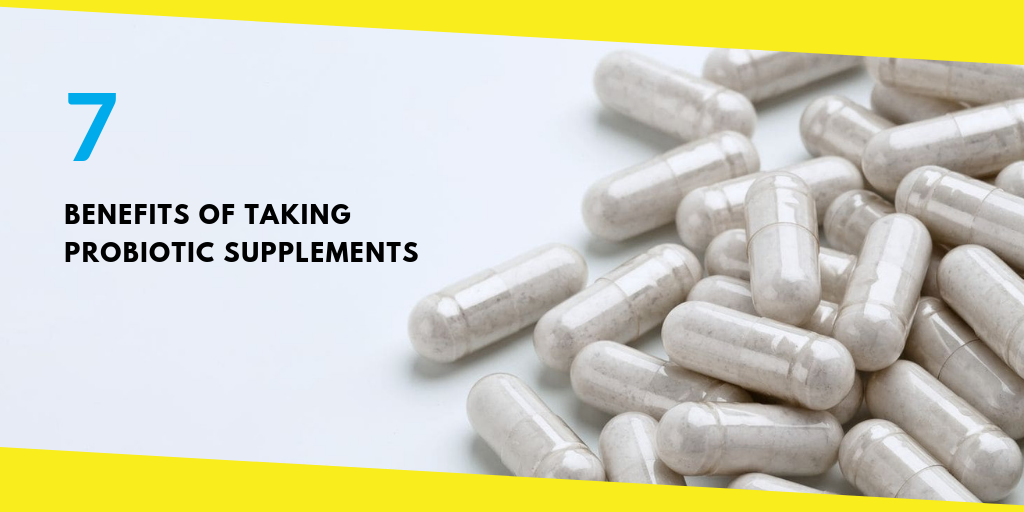7 Benefits of Taking Probiotic Supplements
This post was last updated on September 26th, 2023

Probiotics are living microorganisms that help to prevent and treat some illnesses. They promote a healthy digestive tract and immune system to fight against antibodies. Besides this, they improve mental health, reduce allergies, prevent eczema symptoms, and more!
Though you can supply your body with probiotics through naturally fermented foods, sometimes it is necessary to take extra probiotic supplements.
Below are the seven health benefits of taking probiotics –
1. Probiotics Help Balance The Digestive Enzymes
Probiotics are ‘good bacteria’ that reside in the lower intestinal tract and help to process food. Some conditions such as illness, poor diet, or intake of antibiotics sometimes cause an imbalance in the gut bacteria. It may cause allergies, obesity, mental health problems, digestive issues, and other major issues.
When your gut becomes imbalanced with unhealthy levels of bacteria, probiotics can help restore the balance. They secrete protective substances that turn on the immune system and prevent microbes from creating major disease. Taking probiotics with antibiotics help reduce the consequences and improve symptoms.
2. They Can Prevent And Treat Gastrointestinal Problems
Sometimes, antibiotics affect the balance of good and bad bacteria present in the gut that may cause Diarrhea. Some studies suggest that probiotics can be used for the prevention and treatment of antibiotic-associated diarrhea. They can lessen the duration and effects of infectious diarrhea as well.
Besides, it also reduces the severity of gastrointestinal symptoms such as bloating, constipation, gas, etc. However, effectiveness varies depending upon the type and dose of the probiotic you take. You can consider DrFormulas probiotic supplement containing Saccharomyces boulardii and other digestive enzymes to treat intestinal issues such as:
- Irritable bowel syndrome
- Crohn’s disease
- Stomach ulcers
- Digestive tract infection
- Pouchitis (a side-effect caused as a result of surgery that removes Colon)
3. They Regulate Cholesterol And Keep Heart Healthy
Probiotics help to lower the bad low-density cholesterol (LDL) and blood pressure. The lactic-acid producing bacteria break down the bile present in the gut that is made of cholesterol. By doing so, they prevent bile from being absorbed in the stomach or enter the blood.
4. They Help To Maintain Genital Health
Lactobacilli strains target the survival of harmful microorganisms and maintain vaginal health. However, this naturally balanced system gets disturbed by several factors, including antibiotics, contraceptive pills, etc. You can consider probiotic treatment to restore the balance for genital problems such as yeast infections, bacterial vaginosis, urinary tract infection, etc.
5. They Can Reduce The Severity Of Eczema And Allergies
Several probiotic strains help to reduce the symptoms of eczema in children and infants. According to a study, infants fed with probiotic-supplemented milk show improved symptoms compared to those fed with ordinary milk. Further, they can also lower the inflammatory responses in people who have allergy from dairy products.
6. They Help To Boost Your Immune System
Probiotics give a boost to your immune system by inhibiting the growth of harmful gut bacteria. They promote the production of natural antibodies and immune cells such as T lymphocytes, IgA-producing cells, etc. This way, they empower the body to fight against infections.
7. They Can Improve Mental Health Conditions
Many times, the gut has been ‘second brain’ as they both produce many of the same neurotransmitters such as dopamine, serotonin, etc. They play a crucial role in regulating mood and mental health. Therefore, taking probiotic supplements can improve anxiety, autism, depression, memory, and obsessive-compulsive disorder (OCD).
Conclusion
There is no denying that probiotics help to improve health in so many ways, but it is important to consume adequate amounts to reap the best benefits. Further, you can take fermented foods such as yogurts, pickled vegetables, soy, etc. as the natural sources of probiotics.
You may like this
Recommended For You
8 Easy Tips To Deal With Sweat In Summers
Most Inside
Most Inside offers high-quality recommendations and valuable updates to enhance all aspects of your life, providing premium guidance and enriching experiences.




